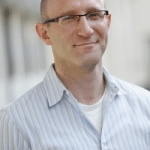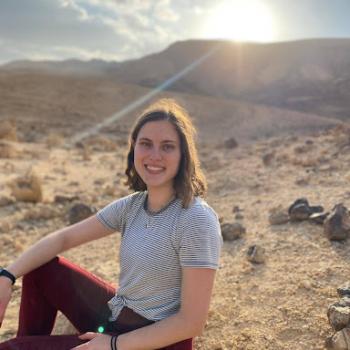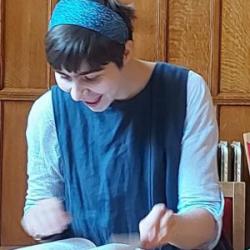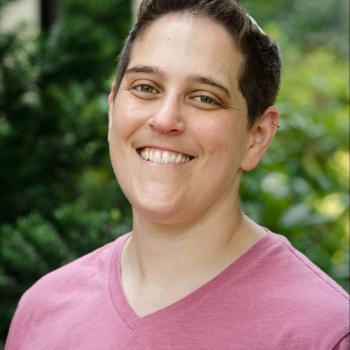Parashat Re’eh (Deuteronomy 11:26 – 16:17)
By Frankie Sandmel | Aug 15, 2020
Re’eh—perceive, see, consider—I set before you blessing and curse: the blessing, if you obey the commandments of the LORD your God that I enjoin upon you this day; and the curse if you do not obey the commandments of the LORD your God
Our parashah opens with a powerful entreaty from God—you have a choice: follow my ways and be blessed, stray from my ways and be cursed. God then proceeds to lay out the core mitzvot that will form the structure of Israelite society: where to worship, what we eat, how to set up an equitable economic system, and when our national holidays will be. On this list, snuck into a long section about what we eat and how, we get a stern warning against following false prophets. We are instructed not to be tempted by their signs and promises—even if their predictions come true—and we are told to be harsh in punishing those who lead us astray—even if they are our dearest sibling.
Prophecy has been on my mind a lot this summer, as protests fill our streets and the next election looms on the horizon. Recently, I had the privilege of teaching sixth graders about the prophets of the Tanakh. In my class, I taught that the Prophets in the Torah had a vision for the way the world should be and that their prophetic power came from bringing others into their dream—that prophets inspire communities to come together and build the just world that they know is possible. We paired our learning about our ancient prophets with an exploration of modern prophetic vision, looking for the echo of Isaiah’s words: “No, this is the fast I desire: to unlock the fetters of wickedness, and untie the cords of the yoke to let the oppressed go free; to break off every yoke?” (Isaiah 58:6) in modern voices like Naomi Wadler, an 11-year-old Jewish activist who spoke powerfully at the March for Our Lives, a national rally against gun violence in 2018: “My friends and I might still be 11, and we might still be in elementary school, but we know. We know life isn’t equal for everyone, and we know what is right and wrong.” Even writing this, I feel my heart swell with hope for what some good prophecy brings to our broken world today.
But in our parashah, the instructions around prophecy are given in the negative—we are not told to follow good prophets and dreamers like Isaiah and Wadler, but to root out the bad ones:
יָצְא֞וּ אֲנָשִׁ֤ים בְּנֵֽי־בְלִיַּ֙עַל֙ מִקִּרְבֶּ֔ךָ וַיַּדִּ֛יחוּ אֶת־יֹשְׁבֵ֥י עִירָ֖ם לֵאמֹ֑ר נֵלְכָ֗ה וְנַעַבְדָ֛ה אֱלֹהִ֥ים אֲחֵרִ֖ים אֲשֶׁ֥ר לֹא־יְדַעְתֶּֽם׃ וְדָרַשְׁתָּ֧ וְחָקַרְתָּ֧ וְשָׁאַלְתָּ֖ הֵיטֵ֑ב וְהִנֵּ֤ה אֱמֶת֙ נָכ֣וֹן הַדָּבָ֔ר נֶעֶשְׂתָ֛ה הַתּוֹעֵבָ֥ה הַזֹּ֖את בְּקִרְבֶּֽךָ׃
If you hear it said, of one of the towns that the LORD your God is giving you to dwell in, that some scoundrels from among you have gone and subverted the inhabitants of their town, saying, “Come let us worship other gods”—whom you have not experienced—you shall investigate and inquire and interrogate thoroughly.
This summer has been awash in prophecy. As black people and others enraged by the racism and inequity in our country pour into the streets to advocate for a world without racist police violence—for a society where black lives are celebrated and cherished—I have been deeply moved by the prophetic vision that these protests have amplified. And, hand in hand with the proactive call for a world without police violence, videos of white people calling the police on black folks going about their daily lives have come with a challenge to non-black communities: investigate, inquire, and interrogate thoroughly the ways in which you and your communities have had a hand in perpetuating racism.
While our parashah’s attention to “scoundrels” points to a malicious individual leading us astray, in today’s world the scoundrels are more like unconscious biases, ignorance, and powerful, often invisible systems. And though the forces are different, the call to root them out resonates: the uprising this summer has pushed me to dig into my own proclivities, to have hard conversations with my family, and to look closely at the institutions and communities I know and love, asking: how have we been led astray by false promises? How have I absorbed toxic ideologies? And how can I root them out and destroy them, so that I can continue to be on the path of blessing that God promises. The call of our parashah not to shy away from this project, not even in our closest of kin, is particularly cutting and resonant.
We are in Parashat Re’eh—see, perceive, notice. Discerning the path of blessing from the path of curses, false prophets from true prophets, is not a simple task. This entreaty, re’eh, pushes us to be careful and attentive as we move through the world, as we build a society that is holy and just. And in this careful, discerning building that our parashah foretells, the warning against false prophecy comes as a firm reminder that even as we build we must continue to investigate our actions and our communities for the ways that we might be straying from the path—for the forces tempting us away from justice and equity. And, we must hold onto the bravery and clarity of purpose that it takes root out that evil and reground on the path of blessing.
Frankie Sandmel (they, them, their) is a student at the Rabbinical School of Hebrew College in Newton Centre, MA.

















